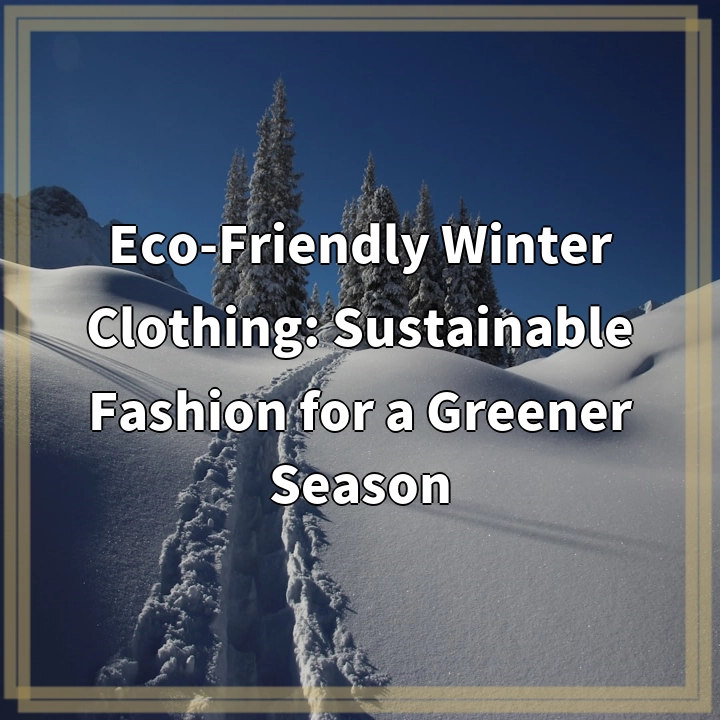
What is Eco-Friendly Winter Clothing?
Eco-friendly winter clothing refers to garments and accessories that are designed and manufactured using environmentally sustainable practices. These clothing items are made from organic, recycled, or ethically sourced materials, and they prioritize reducing the overall carbon footprint throughout their life cycle.
Real-World Problems Associated with Eco-Friendly Winter Clothing
While eco-friendly winter clothing offers numerous benefits, there are still some challenges and limitations that need to be addressed. Understanding these problems is essential for finding effective solutions and making informed choices:
Limited Availability and Accessibility
One of the main challenges of eco-friendly winter clothing is the limited availability and accessibility compared to conventional winter wear. Sustainable fashion brands are still emerging and may have fewer physical stores or distribution channels. This can limit options for consumers who want to make sustainable choices.
Higher Price Tags
Eco-friendly winter clothing often comes with higher price tags compared to conventional alternatives. This can be attributed to the higher production costs associated with using sustainable materials and ethical labor practices. The affordability of eco-friendly winter wear remains a barrier for many consumers.
Lack of Awareness
Many consumers are still unaware of the environmental impact of the fashion industry and the importance of eco-friendly clothing. There is a need for greater education and awareness about the benefits and options available in sustainable winter wear. By raising awareness, we can encourage more people to make conscious choices and support sustainable fashion brands.
Complex Supply Chains
The fashion industry has complex supply chains, making it difficult to trace the origin of materials and ensure ethical practices at every stage. Achieving complete transparency and accountability throughout the supply chain is a significant challenge, but efforts are being made by sustainable fashion brands to improve traceability.
Consumer Mindsets and Fast Fashion Culture
The prevailing consumer mindset and fast fashion culture contribute significantly to the challenges of eco-friendly winter clothing. Many consumers are accustomed to trends and low-cost clothing, often overlooking sustainability factors. Shifting consumer mindsets and promoting a more conscious approach to fashion are necessary to overcome these challenges.
Impacts on Comfort and Performance
Some eco-friendly winter clothing may face challenges in terms of comfort and performance compared to conventional options. Finding the right balance between sustainability and functionality is essential. However, advancements in technology and innovative design approaches are addressing these concerns, leading to better-performing sustainable winter wear.
Waste Management and Disposal
Proper waste management and disposal of winter clothing, especially when it reaches the end of its life cycle, remain challenging. Many garments end up in landfills, contributing to environmental pollution. Implementing efficient recycling and upcycling systems, as well as encouraging responsible consumer behavior, are crucial for minimizing waste.
Fair Labor Practices
Ensuring fair labor practices in the fashion industry is an ongoing challenge. Many garment workers are subjected to low wages, unsafe working conditions, and exploitation. Eco-friendly winter clothing brands strive to address these issues, but there is still work to be done to improve labor standards and rights.

Solutions for Eco-Friendly Winter Clothing
Despite the challenges associated with eco-friendly winter clothing, there are several solutions that are being implemented to address these issues:
Increasing Availability and Accessibility
Sustainable fashion brands are working towards expanding their presence both online and offline, making eco-friendly winter wear more accessible to consumers. Collaborations with mainstream retailers and the establishment of dedicated sustainable fashion marketplaces are also helping to increase availability.
Promoting Affordability
Efforts are being made to make eco-friendly winter clothing more affordable. Sustainable fashion brands are exploring cost-effective production methods, sourcing materials more efficiently, and developing partnerships to reduce prices without compromising sustainability.
Raising Awareness
Education and awareness campaigns are crucial to inform consumers about the environmental impact of the fashion industry and the benefits of choosing eco-friendly winter clothing. Advertising sustainable fashion options and highlighting their positive implications can help shift consumer mindsets towards more conscious choices.
Improving Supply Chain Transparency
Sustainable fashion brands are working towards increasing transparency and traceability in their supply chains. This involves collaborating with suppliers, using certifications and labeling systems, and sharing information with consumers about the origin and production process of the clothing they purchase.
Promoting Conscious Consumerism
Encouraging consumers to adopt a more conscious approach to fashion is essential. By understanding the true cost of fast fashion and the environmental implications, consumers can make more informed choices and support sustainable fashion brands. Promoting the concept of quality over quantity and the longevity of clothing can contribute to reducing waste.
Advancing Technology and Design
Continuous advancements in technology and innovative design approaches are helping to overcome the performance limitations of eco-friendly winter clothing. Sustainable materials are being developed to offer better comfort, insulation, and durability, ensuring that sustainable options can compete with conventional alternatives in terms of functionality.
Implementing Recycling and Upcycling Systems
Eco-friendly winter clothing brands are focusing on implementing efficient recycling and upcycling systems to reduce waste. By designing garments that can be easily disassembled and repurposed, and by offering take-back programs and garment recycling initiatives, brands are closing the loop and minimizing the environmental impact of their products.
Ensuring Ethical Labor Practices
Sustainable fashion brands place a strong emphasis on fair labor practices. They actively work towards ensuring safe and fair working conditions, fair wages, and worker empowerment. Certifications, audits, and partnerships with ethical organizations help guarantee that the workers involved in producing eco-friendly winter clothing are treated fairly.















